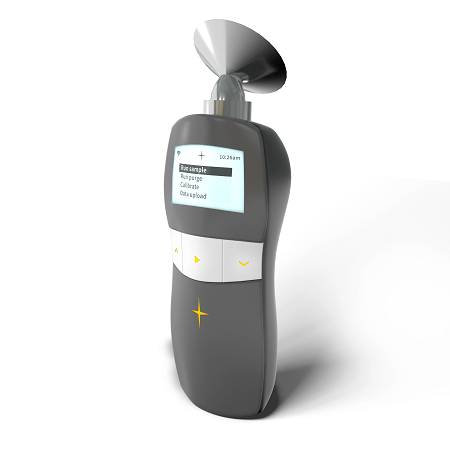
Company of the Month – Arctech Innovation
Arctech Innovation is bringing together artificial intelligence and the genius of nature to realise their ambitious vision for predicting and preventing disease, globally.
We spoke to co-founder and CEO, Professor James Logan, about their product pipeline, upcoming investment round, and ambitious vision for health monitoring.
From academia to entrepreneurialism
The journey began in the Department of Disease Control at the London School of Hygiene & Tropical Medicine (LSHTM), where Prof James Logan was leading research investigating novel methods for detecting and controlling vector-borne diseases (infectious diseases transmitted through the bite of a living organism, such as a blood-sucking insect). In 2011, born out of James’ desire to bridge the gap between academic research and the needs of industry, he founded ARCTEC.
“After joining LSHTM in 2010, I saw a real opportunity – there was a clear desire from industry to interact more with academic institutions strong on scientific expertise, to help develop new vector (pest) control products. But, despite the real benefits for academia, there was still a lot of caution around collaboration with commercial companies.”
James assembled a leading team of researchers and commercial experts, and ARCTEC grew into a thriving contract research organisation over the next ten years, working with over 500 different clients and partners, and facilitating over 300 products going to market.
However, nurturing a successful commercial enterprise in tandem with running his own research group within LSHTM didn’t stop James from seeing another opportunity. In 2015, along with co-founder Professor Mary Cameron, he spun out a second company – Vecotech – this time with a focus on commercialising the scientific discoveries and pioneering intellectual property coming out of LSHTM.
“We had developed a new method of targeting bed bugs that had real potential, but, as is often the case, it wasn’t going to be exploited by the university. We didn’t want it to just sit there, going no further, when we knew there was a promising product there.”
In 2021, ARCTEC was also spun out of LSHTM as a company and merged with Vecotech to form a multi-faceted business – Arctech Innovation. The company now has over 25 employees, working across sectors as diverse as medical diagnostics, pest control, software design and social impact.
An exciting pipeline of products
Whilst Arctech Innovation’s origin story may have begun in a university lab, over the past decade they have firmly been operating in the private sector and are clear-sighted in their approach to bringing their own innovations to market.
They are working with global go-to-market commercial partners to accelerate the process, with their current product pipeline focused on two categories: pest control and disease diagnostics.
The proprietary discovery platform that sits at the heart of everything, Semeion iQ(™), exploits the incredible odour sensing capabilities of insects:
“Essentially, we can use an insect as a biosensor to decode an odour signature. A good example is for malaria, where we know mosquitoes are more attracted to infected people because of changes in their odour caused by the infection. Our proprietary process allows us to see what a mosquito is smelling and unlock the odour signature of a disease – it’s almost like a fingerprint. This equips us with new ways to predict, prevent and manage malaria which could save countless lives.”
Disease diagnostics
 Once the fingerprint has been identified, the team translates this discovery into its platform technology – using sensors and AI-powered algorithms – to detect early-stage infections.
Once the fingerprint has been identified, the team translates this discovery into its platform technology – using sensors and AI-powered algorithms – to detect early-stage infections.
The company has already developed a handheld, non-invasive prototype device for rapidly detecting malaria (a disease responsible for 627,000 deaths in 2020). Following promising results from lab and field testing, plans are to launch this product within the next two years.
As sensors can be made ever smaller and cheaper, James sees huge opportunities for the development of this technology and, eventually, deploying them through wearable tech. As well as adapting it for use across multiple sectors, from human to animal health, agriculture to biosecurity, there is the potential for a new way of health monitoring:
“There is no current comparable, non-invasive method for detecting disease. All other approaches involve taking a sample of blood, urine or saliva. The opportunity that this presents is, ultimately, an Internet of Things-type approach to health monitoring. With rapid detection, we could respond to outbreaks much quicker than we can now, and by harnessing and interrogating the data, we can even predict future outbreaks.”
Luring and controlling pests
The other key product development area is in the exploitation of odour to lure and control pests.
Following the initial soft launch of its BugScents™ bed bug lure in 2021, the team plans to launch an accompanying trap in 2023 that will offer a complete remote monitoring solution for rapid detection of bed bug infestations, including for hotels.
The system incorporates their sensor technology, providing a SMART monitoring solution that detects when a bed bug has been captured, sends an alert, so swift action can be taken to prevent an infestation.
Similar novel control products are also in development for other pests, including mosquitoes. With more than half the world’s population at risk of dengue, this more sophisticated approach to pest management has huge potential global health benefits.
Partnership-driven growth
Whilst its contract research business unit has always been self-funding, Arctech Innovation has also benefited from grant funding and investment to develop their own innovative products.
They have received funding from UKRI’s Biotechnology and Biological Sciences Research Council (BBSRC), several grants from Innovate UK, and an EU grant, as well as funding from the Bill and Melinda Gates Foundation. They’re also currently part of the FIND Accelerator Programme for novel diagnostics, which James says has helped speed up the development of their sensor technology, through access to field sites, samples and a potential route to market.
Angel investors have supported the business since its Vecotech days, but now they are launching a Series A round of investment to accelerate their next phase of growth and innovation, with details to be announced soon.
To support their upcoming investment round, they are working with MedCity to make connections via the MedCity Investment Hub. This follows support they received from MedCity to identify lab space at Londoneast-uk Business & Technical Park, where their facilities have been located since last year.
“Staying in London was important to us for many reasons, not least for access to London-based talent, partners and investors. But when we started looking for space, it was nearly impossible to find. We were put in touch with MedCity via the Deputy Mayor and the Mayor of London’s office, and the support we had to find space and go through the whole process was really useful. Londoneast-UK has been great for us – it’s more affordable than Central London, but we’re still part of the hub, with easy access to everything London offers.”
James also credits earlier development programmes for some of his ease with straddling both academia and industry:
“Going back to when I completed my PhD, I took part in The Biotechnology Young Entrepreneurs Scheme (YES), run by UKRI. That was hugely valuable for learning about business, startups and commercialisation. As a young academic at the time, it gave me the confidence in writing business plans and recognising commercial opportunities. I’ve learned a lot over the last 13 years on the job, leading a business, and I think it goes to show that, with the right encouragement and support, people who start in academia can be successful in business.”
A paradigm-shifting vision
With their pipeline of product launches, it’s looking set to be a busy few years ahead for Arctech Innovation. But James has his eye on a much bigger prize in the longer term:
“We live in a bug’s world. For every one of us, there’s around 500 million of them. We know that the next pandemic is likely to be an insect-borne disease, and we need better ways to be prepared for that. Insects and diseases are adapting to existing approaches like toxic chemicals and drugs – so we’ve seen progress on malaria going into reverse and dengue on the rise. Our vision for bringing together artificial intelligence with the genius of nature is a completely new approach. The ultimate aim is to establish a worldwide web of wearable devices that will allow us to predict, prevent and manage disease outbreaks. We want to create a new paradigm in public health monitoring: rapid, real-time, and accessible to everyone, everywhere.”
Find out more: arctechinnovation.com